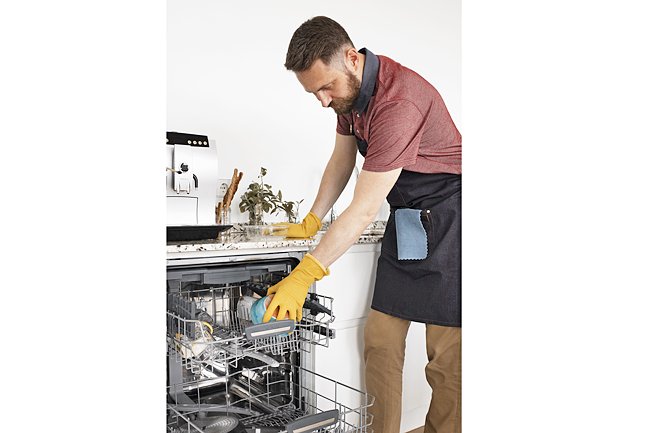THE WASHINGTON POST – Common sense plays a big part in determining when many things should be cleaned – if it looks dirty or smells sour, probably best to give it a detox. Other times, though, an item’s cleanliness (or lack thereof) isn’t so obvious. When’s the last time you laundered the throw blanket in your living room, for instance? And do you really need to clean the inside of your washing machine? In cases like those, experts said there are some rules of thumb to help.
So, are you cleaning the things around your house frequently enough? Test your knowledge below. And remember, these are generalities.
If you live with pets, kids or other especially messy folks, you’ll probably want to intensify your cleaning game. Same goes if you have immunocompromised people living with you or visiting.
BATH TOWELS
You should wash your bath towels once a week and maybe more. If you bathe multiple times a day or live in an area with high humidity, experts recommend changing your towels closer to every three days.
“That towel is never really going to dry out,” said Bruce Vance, who co-owns Town; Country Cleaning Service with his wife, Sarah, in Pittsboro, North Carolina. “Even assuming you’re not all that dirty, the ability to build up bacteria is going to be fairly rapid.”
Bathroom hand towels follow the same rules. Washcloths, on the other hand, should be washed after every use.
“It’s the one that really gets the germs,” said Patric Richardson, host of Discovery Plus The Laundry Guy and author of House Love a forthcoming guide to cleaning.

DISH TOWELS
If you use your kitchen towels while cooking, you need to throw them in the laundry after each use because they are probably making contact with raw food – and we’re not just talking about uncooked meat.
An associate professor at Western Sydney University Greg Whiteley who focuses on cleaning and hygiene, said people often don’t realise that leafy greens can cause outbreaks of gastroenteritis and other illnesses.
If you’ve wiped down your counter with a kitchen towel after cutting up raw veggies, that towel should go directly into the wash.
“When you’re in the kitchen and you’re cleaning up your food, salads are nearly as risky a raw food as, say, chicken,” he said.
If you use your dish towels only to dry clean dishes or clean hands after washing them, you can keep them in circulation for three to four days, said Richardson.
He recommends keeping a basket in your kitchen to serve as a hamper.
PET’S BOWLS
If you feed dry food, your dog’s or cat’s food bowl should be washed once a day, though it’s not the most important thing.
Richardson likens a kibble bowl to a bowl of popcorn: “You really should wash it every day, but if it goes a couple of days, it’s okay.”
There’s more urgency when it comes to wet food.
“The second that wet food interacts with the bowl, it has to go. You have to wash it,” said Richardson.
And water bowls should get scrubbed weekly. “That’s largely because eventually something will grow in there, even if it’s not something that makes (your pets) sick,” said an assistant professor at Johns Hopkins University School of Medicine Jonathan Lynch who focuses on the relationship between animals and microorganisms.
PET’S BED
Throw your pet’s bed in the wash every month if your animal is regularly groomed and bathed. For pets that lead a more active, outdoor lifestyle, bump up the frequency to every two weeks, said Richardson.
Similarly, if your dog slobbers excessively, you ought to increase how often you clean their bed. (These timelines assume your pets are on flea and tick preventatives and not bringing those harmful pests inside.)
For the most part, you’ll want to wash pet beds to get rid of odour and mildew because they’re unpleasant, not because they’re particularly unhealthy for your animal, said Lynch.
If the bed doesn’t fit in your washing machine, spot-clean it with a damp towel and laundry detergent, then follow up with a wet towel to get rid of the soap. “Steer clear of dryer sheets, fabric softener, really fragranced detergent, because dogs are very sensitive to chemicals,” said Richardson.
A tip from Whiteley: Dry the bed in the sun if you can, because ultraviolet light kills bacteria.
MICROWAVE
You should wipe down the inside of your microwave weekly, said Whiteley, “not because of the microbiological danger, but because of the smell”.
Unless you always cover the foods you heat up, some of them will end up on the appliance, and they’ll continue to cook every time you turn it on, leading to unappetising aromas.
Director of cooking systems at GE Appliances Amelia Hensley said you’ll make it easier on yourself if you always clean up after big spills. Target splatter with a soapy sponge or soft cloth, and make sure to avoid bleach, ammonia, abrasive soaps or commercial oven cleaners. If you’ve neglected your microwave to the point that its interior looks like a tie-dye T-shirt, Hensley has some advice: Put some water in a dish and microwave it on full power for three minutes, then leave the door closed for five more minutes. The resulting steam will loosen the residue, making it easier to clean off.
OVEN
The average family should clean their oven at least once a year, possibly twice a year, said Hensley. (If you cook every single meal in the oven, you might want to up it to four to five times.) Regularly cleaning the oven prevents smells and reduces fire risk.
If your oven has a self-cleaning feature, follow those instructions. Otherwise, use soap and water with a wet cloth or non-abrasive sponge inside. To tackle the racks, take them out of the oven and soak them to loosen stuck-on grime.
DISHWASHER
You might assume that, because this device cleans other items, it is always clean. But you’d be wrong. If you’re using your dishwasher regularly, you should at least check monthly whether old food and grime has collected in its crevices.
Sarah Vance recommends running a paper towel along the inside of the rim to see if anything has built up, though you may not like what you uncover: She said she was “shocked, appalled and disgusted” by what she found. Now, she just runs the machine once a month without anything in it to keep it pristine.
Director of engineering for dishwasher advanced systems at GE Appliances Adam Hofmann said you should also clean out the filter in the tub of the dishwasher. Just pop it out and give it a rinse before putting it back in place. Neglecting your filter can keep your dishes from sparkling.
WASHING MACHINE
It’s especially important to clean your washer once a month if you have a front-loading machine, said executive director of product management for clothes care at GE Appliances Michael Mattingly. He also recommends leaving the door and detergent dispenser open after each cycle to allow them to dry.
He suggests checking the rubber seal on the door for buildup, which you can wipe out with a rag, especially if you have long hair or pets. You will also want to remove the dispenser drawer and clean it with hot water in the sink.
For top-loading machines, a monthly cleaning is still important if you’re laundering soiled fabrics, have bad water quality or rely on well water.
THROW BLANKETS
This is another category that varies based on who lives in your house. If you have pets and kids snuggling up with your blankets or dragging them onto the floor, you’ll want to wash them more often. But Richardson said that every two months is generally sufficient for cleaning throw blankets, because they don’t come into contact with skin the way that bedsheets do. And don’t forget about the removable covers on your throw pillows (assuming they reside on furniture that gets daily use). Richardson recommends tossing those into the wash about twice a year.
BED SHEETS
You should wash your bedsheets at least once a week, to get rid of built-up skin cells, dust mites and odors, said Richardson.
The more living creatures (human or pet) that use your bed or the fewer clothes you wear when you sleep, the more frequently you should wash.
DUVET COVER
If you’re using a top sheet, you can generally go about a month before needing to clean your duvet cover, said Richardson. (If you don’t use a top sheet, then your duvet cover is constantly touching your skin and ought to be washed alongside the rest of your sheets).
When it comes to duvet inserts, you can generally go longer between cleanings. As long as yours doesn’t make direct contact with people or pets, it needs to be washed only quarterly “because it’s not getting any soil on it”, said Whiteley.
AREA RUGS
While vacuuming area rugs is fine for typical maintenance, it doesn’t sterilise them, said Lynch. For that, you’ll need to use a steam vacuum, which you should do at least once a year for rugs that get regular traffic.
Just be sure to dry-vacuum first – otherwise, you’ll make mud, “and mud is much harder to remove than dry dirt”, said Bruce Vance.
The rest of the time, said Richardson, the rule of thumb is to vacuum rugs on a weekly basis.
In rooms that don’t get a lot of use, you can go about two weeks. Regular vacuuming prevents dirt from building up in the rug and ultimately breaking it down. – Rachel Kurzius





